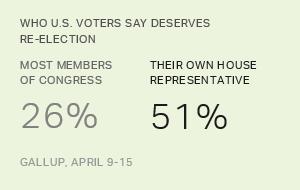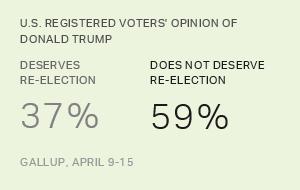Democratic state officials in California, including the governor and attorney general, have made national news over the Golden State's various legal battles with the Trump administration. These battles have led some to wonder if Californians would prefer that the state become an independent country or at least act like one. Last year, National Review observed that California Gov. Jerry Brown's visit to China to negotiate energy policy made his state appear "a quasi-nation-state looking to fill the void in reliable American leadership created by Trump." Similarly, a columnist on Bloomberg recently wrote that Californians see their state as, "a 'quasi-Republic,' far from Washington and entitled to make its own rules."
California officials' strongest move against the Trump administration has been to declare the state itself a sanctuary state, refusing to cooperate with federal agency efforts to identify or detain residents who are living in the U.S. illegally and trying to supersede federal immigration law. In a recent speech in Sacramento, California, U.S. Attorney General Jeff Sessions compared the state's actions to the nullification argument that Southern states made in the 1830s. Brown counter-charged that the Department of Justice was "basically going to war against the state of California" by challenging its state sanctuary law.
California has joined legal action aimed at stopping President Donald Trump's border wall and the inclusion of a question on the 2020 U.S. Census form concerning citizenship. But the list doesn't end there. California's Democratic attorney general has filed 29 lawsuits to block Trump's proposals. Referring to immigration policy, the new senator from California, Kamala Harris, recently tweeted that California was going to "fight" and that the state "represents the future" of America.
California Unique in Size, but Not Opposition to the Trump Administration
Other states have their own grievances against the Trump administration. For instance, New York, New Jersey and Connecticut are challenging aspects of the new tax law in federal court. In 2017, 15 states jointly sued the federal government over its decision to phase out DACA and 17 states (including California) banded together to challenge a rollback of federal energy regulations.
But California's great size and wealth give its actions more political heft -- it could be its own nation-state. Almost 40 million people, or roughly one in eight Americans, now reside there, outnumbering the populations of such important countries as Canada, Australia, Saudi Arabia and Poland. And according to new data, California now has the world's fifth-largest economy.
How Different Is California?
Given the vehemence of opposition to Trump by California's state officials, the question remaining becomes: Is the current situation the beginning of a real political or constitutional separation of the state from the rest of the country, or is it just a reflection of resistance to the current administration's policies by California Democrats?
Although secession talk is not new in California, the latest iteration has some momentum. An anti-Trump group recently received approval from the state attorney general to start collecting signatures to put a referendum on the state ballot in 2020 on whether to declare California independent from the United States.
One way to view the extent of the cleavage between California and the country as a whole is to examine the 2016 presidential vote.
Hillary Clinton defeated Donald Trump in California by over 4 million votes in 2016 -- a full 1 million votes greater than Barack Obama's margin in 2012. As a result, Clinton won California by a whopping 30 points, 61.5% to 31.5%. In the rest of the country, Trump led by roughly one percentage point, 47.6% to 46.5%. Clinton's lead was so sizable in California that the state single-handedly shifted the national popular vote from a slight Trump win to a slight Clinton win, even as Trump prevailed in the Electoral College.
| California | Rest of the U.S. | ||||||||||||||||||||||||||||||||||||||||||||||||||||||||||||||||||||||||||||||||||||||||||||||||||
|---|---|---|---|---|---|---|---|---|---|---|---|---|---|---|---|---|---|---|---|---|---|---|---|---|---|---|---|---|---|---|---|---|---|---|---|---|---|---|---|---|---|---|---|---|---|---|---|---|---|---|---|---|---|---|---|---|---|---|---|---|---|---|---|---|---|---|---|---|---|---|---|---|---|---|---|---|---|---|---|---|---|---|---|---|---|---|---|---|---|---|---|---|---|---|---|---|---|---|---|
| Hillary Clinton | 61.5% | 46.5% | |||||||||||||||||||||||||||||||||||||||||||||||||||||||||||||||||||||||||||||||||||||||||||||||||
| Donald Trump | 31.5% | 47.6% | |||||||||||||||||||||||||||||||||||||||||||||||||||||||||||||||||||||||||||||||||||||||||||||||||
| Net Clinton vote | +30 pct. pts. | -1.1 pct. pts. | |||||||||||||||||||||||||||||||||||||||||||||||||||||||||||||||||||||||||||||||||||||||||||||||||
| Source: https://uselectionatlas.org | |||||||||||||||||||||||||||||||||||||||||||||||||||||||||||||||||||||||||||||||||||||||||||||||||||
Three other political indicators underscore California's leftward leanings: presidential job approval, political party identification and political ideology. On average in 2017, Trump's job approval rating was 29% in California, tied with Hawaii for the third-lowest among the states. Only Massachusetts (27%) and Vermont (26%) were lower. In the rest of the country, it was 40%.
| California | Rest of the U.S. | ||||||||||||||||||||||||||||||||||||||||||||||||||||||||||||||||||||||||||||||||||||||||||||||||||
|---|---|---|---|---|---|---|---|---|---|---|---|---|---|---|---|---|---|---|---|---|---|---|---|---|---|---|---|---|---|---|---|---|---|---|---|---|---|---|---|---|---|---|---|---|---|---|---|---|---|---|---|---|---|---|---|---|---|---|---|---|---|---|---|---|---|---|---|---|---|---|---|---|---|---|---|---|---|---|---|---|---|---|---|---|---|---|---|---|---|---|---|---|---|---|---|---|---|---|---|
| Approve | 29% | 40% | |||||||||||||||||||||||||||||||||||||||||||||||||||||||||||||||||||||||||||||||||||||||||||||||||
| Disapprove | 65% | 54% | |||||||||||||||||||||||||||||||||||||||||||||||||||||||||||||||||||||||||||||||||||||||||||||||||
| Net approval | -36 pct. pts. | -16 pct. pts. | |||||||||||||||||||||||||||||||||||||||||||||||||||||||||||||||||||||||||||||||||||||||||||||||||
| Gallup Daily Tracking, January-December 2017 | |||||||||||||||||||||||||||||||||||||||||||||||||||||||||||||||||||||||||||||||||||||||||||||||||||
Democrats (including independents who lean Democratic) handily outnumber Republicans in California by 51% to 30%, while the rest of the country is about evenly split at 43% Democratic and 39% Republican.
| California | Rest of the U.S. | ||||||||||||||||||||||||||||||||||||||||||||||||||||||||||||||||||||||||||||||||||||||||||||||||||
|---|---|---|---|---|---|---|---|---|---|---|---|---|---|---|---|---|---|---|---|---|---|---|---|---|---|---|---|---|---|---|---|---|---|---|---|---|---|---|---|---|---|---|---|---|---|---|---|---|---|---|---|---|---|---|---|---|---|---|---|---|---|---|---|---|---|---|---|---|---|---|---|---|---|---|---|---|---|---|---|---|---|---|---|---|---|---|---|---|---|---|---|---|---|---|---|---|---|---|---|
| Democrat/Lean Democratic | 51% | 43% | |||||||||||||||||||||||||||||||||||||||||||||||||||||||||||||||||||||||||||||||||||||||||||||||||
| Republican/Lean Republican | 30% | 39% | |||||||||||||||||||||||||||||||||||||||||||||||||||||||||||||||||||||||||||||||||||||||||||||||||
| Net Democratic | +21 pct. pts. | +4 pct. pts. | |||||||||||||||||||||||||||||||||||||||||||||||||||||||||||||||||||||||||||||||||||||||||||||||||
| Gallup Daily Tracking, January-December 2017 | |||||||||||||||||||||||||||||||||||||||||||||||||||||||||||||||||||||||||||||||||||||||||||||||||||
Self-identified liberals outnumber conservatives in California by only three points, 30% vs. 27%. However, in the aggregate, the rest of the country leans conservative by 11 points, 34% to 23%.
| California | Rest of the U.S. | ||||||||||||||||||||||||||||||||||||||||||||||||||||||||||||||||||||||||||||||||||||||||||||||||||
|---|---|---|---|---|---|---|---|---|---|---|---|---|---|---|---|---|---|---|---|---|---|---|---|---|---|---|---|---|---|---|---|---|---|---|---|---|---|---|---|---|---|---|---|---|---|---|---|---|---|---|---|---|---|---|---|---|---|---|---|---|---|---|---|---|---|---|---|---|---|---|---|---|---|---|---|---|---|---|---|---|---|---|---|---|---|---|---|---|---|---|---|---|---|---|---|---|---|---|---|
| % | % | ||||||||||||||||||||||||||||||||||||||||||||||||||||||||||||||||||||||||||||||||||||||||||||||||||
| Liberal | 30 | 23 | |||||||||||||||||||||||||||||||||||||||||||||||||||||||||||||||||||||||||||||||||||||||||||||||||
| Moderate | 37 | 36 | |||||||||||||||||||||||||||||||||||||||||||||||||||||||||||||||||||||||||||||||||||||||||||||||||
| Conservative | 27 | 34 | |||||||||||||||||||||||||||||||||||||||||||||||||||||||||||||||||||||||||||||||||||||||||||||||||
| Net liberal | +3 | -11 | |||||||||||||||||||||||||||||||||||||||||||||||||||||||||||||||||||||||||||||||||||||||||||||||||
| Gallup Daily Tracking, January-December 2017 | |||||||||||||||||||||||||||||||||||||||||||||||||||||||||||||||||||||||||||||||||||||||||||||||||||
Further, a recent Gallup analysis found California experienced one of the biggest decreases in conservatism compared with all the states between 2008 and 2017.
There are also two cultural indicators that speak to California's distinct political nature: ethnic/racial composition and religiosity. Half of Californians are now non-Hispanic white, while 68% of the rest of the country can be described this way. California is also less religious than the nation at large, with 47%, compared with 56%, of adults elsewhere reporting they belong to a church or synagogue.
Californians, While Different, Share Much With Rest of the U.S.
In addition to substantial political and demographic differences between California and the rest of the nation as a whole, Californians have some distinctive political views.
Each March, Gallup measures public concerns about a number of national policy issues, asking respondents if each personally worries them "a great deal," "a fair amount," "only a little" or "not at all." Reviewing combined data from the past four years, from 2014 to 2017, affords enough sample to examine the views of Californians vs. the rest of the country. California emerges as more concerned than the rest of the U.S. with the environment, global warming and income distribution. The rest of the U.S. was more worried about affordable healthcare policies.
| California | Rest of U.S. | Difference | |||||||||||||||||||||||||||||||||||||||||||||||||||||||||||||||||||||||||||||||||||||||||||||||||
|---|---|---|---|---|---|---|---|---|---|---|---|---|---|---|---|---|---|---|---|---|---|---|---|---|---|---|---|---|---|---|---|---|---|---|---|---|---|---|---|---|---|---|---|---|---|---|---|---|---|---|---|---|---|---|---|---|---|---|---|---|---|---|---|---|---|---|---|---|---|---|---|---|---|---|---|---|---|---|---|---|---|---|---|---|---|---|---|---|---|---|---|---|---|---|---|---|---|---|---|
| % | % | % | |||||||||||||||||||||||||||||||||||||||||||||||||||||||||||||||||||||||||||||||||||||||||||||||||
| Income inequality | 59 | 44 | +15 | ||||||||||||||||||||||||||||||||||||||||||||||||||||||||||||||||||||||||||||||||||||||||||||||||
| Quality of the environment | 49 | 40 | +9 | ||||||||||||||||||||||||||||||||||||||||||||||||||||||||||||||||||||||||||||||||||||||||||||||||
| Global warming | 47 | 38 | +9 | ||||||||||||||||||||||||||||||||||||||||||||||||||||||||||||||||||||||||||||||||||||||||||||||||
| Climate change | 34 | 28 | +6 | ||||||||||||||||||||||||||||||||||||||||||||||||||||||||||||||||||||||||||||||||||||||||||||||||
| Affordability of healthcare | 49 | 58 | -9 | ||||||||||||||||||||||||||||||||||||||||||||||||||||||||||||||||||||||||||||||||||||||||||||||||
| 2015-2018 combined March GPSS data | |||||||||||||||||||||||||||||||||||||||||||||||||||||||||||||||||||||||||||||||||||||||||||||||||||
Analyzing 2014-2017 data from Gallup's annual Values study shows only modest differences between Californians and the rest of the country in how they view most of the moral issues tested, including abortion, the death penalty, euthanasia and use of animals in medical testing. The greatest difference was seen on gay marriage, although majorities in both geographical areas were supportive.
| California | Rest of U.S. | Difference | |||||||||||||||||||||||||||||||||||||||||||||||||||||||||||||||||||||||||||||||||||||||||||||||||
|---|---|---|---|---|---|---|---|---|---|---|---|---|---|---|---|---|---|---|---|---|---|---|---|---|---|---|---|---|---|---|---|---|---|---|---|---|---|---|---|---|---|---|---|---|---|---|---|---|---|---|---|---|---|---|---|---|---|---|---|---|---|---|---|---|---|---|---|---|---|---|---|---|---|---|---|---|---|---|---|---|---|---|---|---|---|---|---|---|---|---|---|---|---|---|---|---|---|---|---|
| % | % | pct. pts. | |||||||||||||||||||||||||||||||||||||||||||||||||||||||||||||||||||||||||||||||||||||||||||||||||
| Gay marriages should be valid | 68 | 59 | +9 | ||||||||||||||||||||||||||||||||||||||||||||||||||||||||||||||||||||||||||||||||||||||||||||||||
| Pro-choice | 54 | 47 | +7 | ||||||||||||||||||||||||||||||||||||||||||||||||||||||||||||||||||||||||||||||||||||||||||||||||
| Doctor assisted suicide should be allowed | 68 | 71 | -3 | ||||||||||||||||||||||||||||||||||||||||||||||||||||||||||||||||||||||||||||||||||||||||||||||||
| Death penalty morally acceptable | 55 | 60 | -5 | ||||||||||||||||||||||||||||||||||||||||||||||||||||||||||||||||||||||||||||||||||||||||||||||||
| Medical testing on animals morally acceptable | 49 | 55 | -6 | ||||||||||||||||||||||||||||||||||||||||||||||||||||||||||||||||||||||||||||||||||||||||||||||||
| 2014-2017 combined May GPSS data | |||||||||||||||||||||||||||||||||||||||||||||||||||||||||||||||||||||||||||||||||||||||||||||||||||
Bottom Line
As demonstrated by their results in the 2016 presidential election, Californians have largely shifted their party allegiance to the Democrats, in contrast to the rest of the country. Californians' greater concern about income inequality, the environment, and the threat of global warming play a role in this strong Democratic tilt.
The more important factor could be that California has undergone sharp demographic shifts, especially if one compares today to the turn of the century in 2000. The greatest shift has been the increase of 4 million Hispanics to bring the estimated population to 15 million Hispanics in California today (estimates as of 2017).
Given the political differences between California and the rest of the U.S., contentious legal struggles between California and Washington, D.C., are likely to continue as a key political battle zone as long Trump is in office. The answer to the question of whether Californians decide the differences are so extreme as to warrant a constitutional divorce from the rest of the U.S. will have to wait for the proposed "Calexit" referendum vote in 2020, if approved as a ballot item.
In the meantime, it appears that California's state officials, exercising their political and legal influence as the largest state in the U.S., have opted to oppose the policies of the Trump administration. Supported by Congress, this two-front resistance plan could be difficult for any administration to combat.





